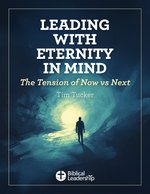The art of negotiation is a critical skill for a leader. You’re always wheeling and dealing in a good way, trying to make things better for yourself and those you lead.
Let’s look at that one key factor that most often determines success in church consultations. You might be surprised.
Jesus never intended for the church to be a subculture but, rather, the counterculture. The church was not meant to assimilate itself into society, but to change society by transforming its cities.
Here are 10 life lessons learned I’ve learned during the past several months of my very busy season of life.
Leaders solve problems. And whatever problem you’re facing, clarifying your thinking is always the first-step to move you towards a solution. Such clarity of thought became something of a lifeline when I encountered a serious problem in a small airport in an impoverished country in east Africa.
Unfreeze, change and refreeze. These three words have helped many organizations change.
Dreams often take a long time to come to fulfillment. God’s Dreams, like Joseph’s, are worth the wait, however long they take.
Ending your day well might be the key to beginning the next day well.
On the one hand, I am hopeful for local congregations. I continue to see God working in countless churches. On the other hand, I see numerous warnings, more than I can remember in my lifetime. I call those warnings “fault lines.”
Personal development is leadership development. Taking care of your body is justified. It is worth the time and effort. It’s an investment, not a luxury. It’s part of how you lead well.
A key leadership aspect that can greatly impact a ministry is finding a niche. A discovered thought area where you can flourish and become an expert.
If we can choose to bless a company being driven, directed, and guided by a person who loves Jesus, then that is a business I want to support, and I'd love you to support, too.
As our bodies age, so do our brains. Fortunately, we don’t have to let our brains atrophy as we age. Here are some choices we can make to help keep them sharp.
Our sinful hearts create an inner self that looks after its own.
It has been said, "If the devil can't make you bad, he'll make you busy." Someone who is too busy to do the right thing is almost as bad as the person who does the wrong thing.
Most leaders—even seasoned ones—blow the biggest learning opportunity that comes their way in a day. Instead of seizing it, they dismiss it, defend it and think they’ve won.
What hardships are you experiencing in this season of work? Have you lost a job? Been a victim of injustice? Or are you simply not as far along in your career as you once dreamed? Trust in the hope that “in all things God works for the good of those who love him” (Romans 8:28).
It’s a pleasure to have a good employer. It’s a pleasure to have satisfying work. To make a heart commitment to work when conditions are good is fairly easy. On the other hand, it’s sad to see, or to be, people whose hearts aren’t in their work.
Very rarely do businesses set vision statements that are too small. The tendency is to either have no vision at all or one that is improbably grandiose. Both are errors.
In my view, leaders should not lurch from crisis to crisis, or even from glory to glory, without seeking to recognize the specific thread of grace that God is weaving through their lives.






















